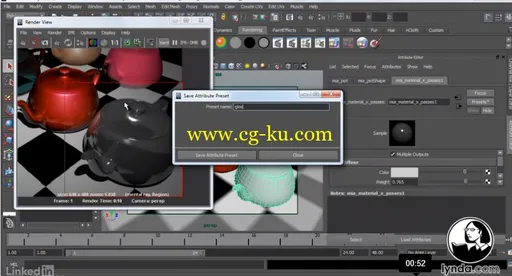
Duration: 3h 30m | Video: h264, 1280x720 | Audio: AAC, 44100 Hz, 2 Ch | 620 MB
Genre: eLearning | Language: English | Skill Level: Intermediate
with Eric Keller shows how to create textures and materials, and then apply them to models to render realistic surfaces. The course covers working with the mental ray shading nodes, including the mental images architectural node, subsurface scattering nodes, occlusion, and car paint shaders, as well as how to incorporate these nodes into shading networks using the Hypershade editor. It also explores using textures, Maya software nodes, normal maps, and displacement maps for adding detail to models. Exercise files accompany the course.
Topics include:
Understanding shading concepts
Simulating the Fresnel effect for realistic reflections
Rendering transparent and translucent surfaces
Comparing mental ray and Maya standard shaders
Introducing the mia_material
Developing shader networks
Using subsurface scattering shaders
Mapping polygon UV coordinates
Incorporating texture nodes into networks
Improving skin detail with ambient occlusion
Painting bump maps
Creating normal and displacement maps
Troubleshooting maps
持续时间:3h 30m |视频:H264,1280x720 |音频:AAC,44100赫兹,2 CH | 620 MB
类型:学习|语言:英语|技能等级:中级
Eric Keller演示了如何创建纹理和材质,然后将它们应用到模型中以呈现真实的表面。本课程涵盖了工作与心理阴影节点线,包括精神形象的建筑节点,次表面散射的节点,闭塞,汽车漆着色器,以及如何将这些节点为阴影网络在Hypershade编辑器使用。它还探讨了使用纹理、玛雅软件节点、法线贴图和位移图来为模型添加细节。课程附带练习文件。
主题包括:
遮光概念的理解
模拟真实的反射效果的菲涅尔
透明和半透明表面呈现
比较mental ray和玛雅标准着色器
介绍mia_material
着色器网络发展
使用地下散射着色器
绘制多边形紫外坐标
将纹理节点并入网络
改善周围环境的皮肤细节
画的凹凸贴图
创建法线贴图和位移贴图
故障图